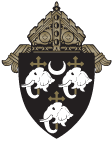 Catechetical Sunday honors the dedicated women and men throughout our diocese who serve as catechists. They are witnesses to and teachers of Catholic faith to children, teenagers and adults. This annual celebration recognizes and thanks them for their ministries and prays for them. Catechists provide a necessary and important work in the church; handing on the contents of Catholic beliefs.
Catechetical Sunday honors the dedicated women and men throughout our diocese who serve as catechists. They are witnesses to and teachers of Catholic faith to children, teenagers and adults. This annual celebration recognizes and thanks them for their ministries and prays for them. Catechists provide a necessary and important work in the church; handing on the contents of Catholic beliefs.
The first teachers of the faith are parents but their teaching role is distinct from that of a catechist. Parents teach by example of lived faith; catechists teach by instruction. Theirs is a pedagogical role. Catechists educate; that is, they lead their students to know the content of what the Church knows and believes about God. Of course, this knowledge is passed on according to the developmental level of their students. For example, what a second grader can know and understand about the Sacrament of the Holy Eucharist is different from what a high school sophomore can know and understand.
This year the theme for Catechetical Sunday, STAY WITH US, is expressed in the accompanying logo which pictures Jesus and two people walking surrounded by a variety of scenes taken out of life: family, business, hospital and other such scenes. One of the goals of Catechetics is to prepare the student for life, its challenges, worries, ups and downs; its daily joys and heartbreaks, its pleasures and pains. The content of Catholic faith not only speaks to each of these situations but also can prepare the student to deal with them. In each of them Jesus is present.
A catechist teaches what the church teaches. For example, a catechist teaching about prayer would have to instruct her or his students in the immanence of God who is near to each of us; who is Emmanuel, God with us in the person of Jesus and in the power of the Holy Spirit. At the same time God is transcendent, beyond us, unlike us. Praying involves both of these divine realities. A catechist teaching about the Sacrament of the Anointing of the Sick and Dying must pass on the effects of this Sacrament, such as the healing of the soul of the sick person through the forgiveness of sin. Or, in the case of the dying, the catechist teaches about the Eucharist as the food for the final journey.
Passing on the faith of the Catholic Church to this generation so that it is relevant to them is a challenge. The catechist knows and teaches that the Catholic tradition speaks to the present. The past informs the now. The tradition also exposes the lies that contemporary cultures celebrate and it leads always to the truth. STAY WITH US or accompany us with the truth of faith as we walk through this life here unto life forever with God.
I express to each catechist my sincere gratitude for your ministry. We thank you for your service to the Church. The information and the formation you provide as a catechist influences many lives and through those lives society and culture … STAY WITH US!
Most Reverend Dennis J. Sullivan, D.D.
Bishop of Camden
[imic_button colour=”btn-primary” type=”enabled” link=”https://catholicstarherald.org/catechetical-sunday-sept-15-2019/” target=”_self” extraclass=”” size=”btn-sm”]Read in Catholic Star Herald[/imic_button]
[imic_button colour=”btn-default” type=”enabled” link=”https://catholicstarherald.org/domingo-catequetico-15-de-septiembre-2019/” target=”_self” extraclass=”” size=”btn-sm”]El Domingo Catequético en espanol [/imic_button]
